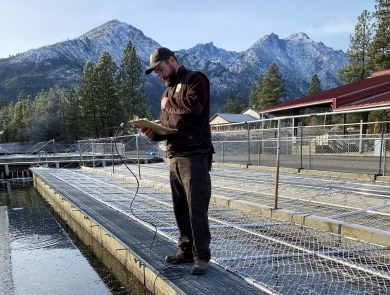The Pacific Region Fish Health Program protects the health and welfare of fish living in the wild and on Federal and partner hatcheries in Idaho, Oregon, and Washington. With healthy fish we can be confident that fish survive in the wild to support the Service’s mitigation and recovery goals.
What We Do
Fish Health Program personnel must apply knowledge of several scientific disciplines including fish biology, microbiology, epidemiology, toxicology, pathology, physiology, histology, and genetics. They must understand environmental conditions and fish requirements, the interactions of wild and cultured fish, and how those factors influence disease and overall aquatic animal health.
Normal Fish Health Program activities include:
- frequently checking on the general health of fish within hatcheries;
- screening for diseases (viral, bacterial, parasites) dangerous to fish;
- investigating health problems in wild fish populations;
- recommending treatments for specific diseases;
- giving advice on how to prevent or minimize impacts of disease on fish populations.
Location and Contact Information
- Pacific Region Fish Health ProgramView DetailsEastside Federal Complex 911 NE 11th Avenue Portland, OR 97232




















